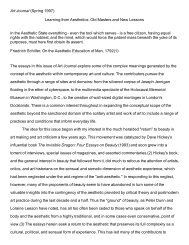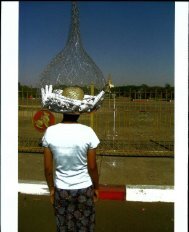Lessons in Futility: Francis Alÿs and the Legacy of ... - Grant Kester
Lessons in Futility: Francis Alÿs and the Legacy of ... - Grant Kester
Lessons in Futility: Francis Alÿs and the Legacy of ... - Grant Kester
You also want an ePaper? Increase the reach of your titles
YUMPU automatically turns print PDFs into web optimized ePapers that Google loves.
Clement Greenberg’s notion <strong>of</strong> formal “movement” <strong>in</strong> <strong>the</strong> development <strong>of</strong> avant-<br />
garde art <strong>in</strong> <strong>the</strong> post-WWII period (as <strong>the</strong> sublimated expression <strong>of</strong> a currently<br />
unrealizable political movement). For Greenberg, <strong>and</strong> many American artists<br />
dur<strong>in</strong>g <strong>the</strong> early years <strong>of</strong> <strong>the</strong> Cold War, substantive political change was blocked<br />
by <strong>the</strong> impasse between a tarnished communism <strong>and</strong> a reviled capitalist<br />
consumer culture. As a result, <strong>the</strong> only option was retreat <strong>in</strong>to <strong>the</strong> protected<br />
enclave <strong>of</strong> <strong>the</strong> canvas, where <strong>the</strong> artist could preserve <strong>the</strong> freedom necessary for<br />
unconstra<strong>in</strong>ed aes<strong>the</strong>tic play. Schiller’s aes<strong>the</strong>tic f<strong>in</strong>ds a more contemporary<br />
expression <strong>in</strong> <strong>the</strong> dilemma <strong>of</strong> French <strong>in</strong>tellectuals <strong>and</strong> artists <strong>in</strong> <strong>the</strong> late 1960s<br />
<strong>and</strong> early ‘70s. Here <strong>the</strong> impossibility <strong>of</strong> positive political change (embodied <strong>in</strong> <strong>the</strong><br />
perceived failure <strong>of</strong> May ’68) legitimated a withdrawal <strong>in</strong>to a zone <strong>of</strong> subversive<br />
textual play <strong>and</strong> écriture. Each <strong>of</strong> <strong>the</strong>se cultural moments proceeds via a<br />
conservational displacement or deferral <strong>of</strong> political critique <strong>in</strong>to a more abstract<br />
critique <strong>of</strong> epistemology per se, evident <strong>in</strong> Greenberg’s attack on representational<br />
art <strong>and</strong> Rol<strong>and</strong> Bar<strong>the</strong>s’ attack on conventional forms <strong>of</strong> signification.<br />
As Peter Starr argues <strong>in</strong> Logics <strong>of</strong> Failed Revolt, <strong>the</strong> underly<strong>in</strong>g lesson <strong>of</strong><br />
May ’68 was based on <strong>the</strong> tw<strong>in</strong> pr<strong>in</strong>ciples <strong>of</strong> “specular doubl<strong>in</strong>g” <strong>and</strong> “structural<br />
repetition,” <strong>in</strong> which all attempts to challenge entrenched power end up<br />
<strong>in</strong>advertently reproduc<strong>in</strong>g it. In Starr’s account, each pr<strong>in</strong>ciple “beg<strong>in</strong>s with <strong>the</strong><br />
uncover<strong>in</strong>g <strong>of</strong> a pseudo-opposition between <strong>the</strong> pr<strong>in</strong>ciples or structures <strong>of</strong> <strong>the</strong><br />
established social order <strong>and</strong> an oppositional force whose action is found to be<br />
deeply complicitous with those pr<strong>in</strong>ciples or structures (repeat<strong>in</strong>g <strong>the</strong>m <strong>and</strong>/or<br />
be<strong>in</strong>g recuperated by <strong>the</strong>m).” The “back to back dismissal” <strong>of</strong> <strong>the</strong>se terms<br />
8




